About Dora
This page is all about Dora Green, her life and how this fund came to exist.
This is the story of a remarkable woman with a passion for education and an equally powerful passion that women should have equal rights with men, and the enduring legacy that she left of a successful girl’s school set in a country house in Sussex, as well as a large number of African women that she educated in the Transkii district in South Africa.
Dora Stanier Harper was born in 1909 to an English missionary based in the Sindh desert in what is now Pakistan. Aged 10 Dora was sent to school in England while her father was building a mission settlement in the desert. Over a period of 22 years, he succeeded in bringing water to the area by digging a watercourse to irrigate and thus form farmland. This still exists and was subsequently enlarged by the Government to become a major canal (through what was arid desert 100 years ago) and is now successfully covered in crops and villages.
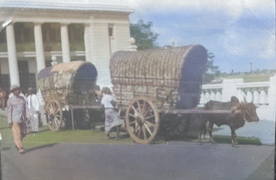
Moving house in Calcutta
Dora was the eldest of five children, and 1919 when her youngest sister Sophie was born and in need of urgent medical care, her mother and all five children returned to England for the health of young Sophie, and also to enable the proper schooling of the four older children. Dora’s father remained in India, only returning to England five years later for a brief holiday, mostly spent touring the country giving lectures to raise funds for the work of the mission. This was the last time any of the family were to see him.
Dora stayed at a boarding school for children of missionaries for seven years and excelled in all sports, becoming very good at hockey and captain of the lacrosse team. She began to write poetry, and became interested in English, Latin and Greek.
During these years her father was busy running the mission district in Pakistan which as a result of his energy had grown to about the half the size of England. He sadly died suddenly in 1926 of a stomach ulcer caused by overwork.
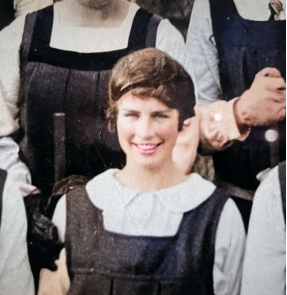
Lacrosse Captain
Aged 18 Dora left school and went to Reading University, gaining a degree in English with Greek drama, and in her final year wrote a thesis on ‘the vindication of the rights of women’. She continued her involvement in sports, was captain of the University lacrosse team, captain of a sailing yacht with university friends, and loved skiing in Austria. In 1927 she went on to start her career as a teacher. Strikingly beautiful and articulate, she had many admirers and rejected several offers of marriage, convinced that she would know when she had met ‘The One’!
In April 1938 she met a dashing young Royal Navy officer, knew at once that he was The One she wanted. They were married four months later, though still pondering (in her diaries) whether she should wear black for her wedding to signify her loss of full independence!
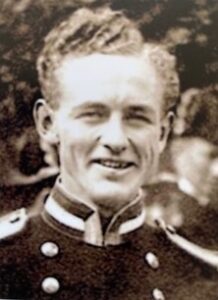
Bill Green
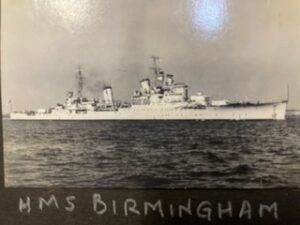
The Royal Navy posted her new husband Bill to HMS Birmingham in the South China Sea, and in those pre-war years if they wanted to be together Dora would have to pay her own way, and she decided to ‘follow the fleet‘ wherever it went.
Travelling alone this took her to Hong Kong, China and Japan and then back again to Hong Kong, and she had many adventures, including some frightening ordeals after Japan had conquered parts of the Chinese coast. At one point an entire British merchant ship was seized by pirates, and the Japanese authorities were harsh and uncompromising in policing the coastline. While searching the harbours looking for Bill’s ship in various dockyards, her lonely travels left her exposed to robbers and smugglers, but she seems to have led a charmed life and always been able to talk her way out of difficult situations.
These travels along the Chinese coast took her to many exciting places, and on one occasion they met unexpectedly when her husband’s ship put into a tiny port whilst she was waiting there to catch a ship back to Hong Kong! Up and down the Chinese coast she was only able to communicate with the local people by sign language and pigeon English, but she found Japan very different and communication was more difficult.
Whilst staying with a friend’s family in Japanese occupied China she received a telegram from Bill one day telling her that his ship was going to a sea port romantically called Wai-Hai-Wai. Without hesitation she set off with a small suitcase by train and ferry right across southern China, Korea and Manchuria.
She had great respect for the Chinese people and came to love their happy outlook, and was amused to notice that when they are at a loss of what to do when embarrassed by praise or blame their response is always to grin and say ‘can do’, and will do anything to avoid having to say ‘no can do’!
In these politically difficult months during the last year of peace leading up to the Second World War she had a number of adventures in her travels. On one occasion whilst staying with the British consul in Dalian on the China coast he remarked ‘I’m not letting you out of my sight until your ship sails…. you are the kind of person that causes international situations!’
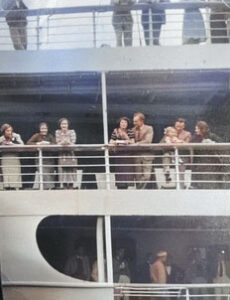
1938 Ship to China
During the war Bill’s daily life in the Royal Navy was fraught with danger, and particularly more so when as a specialist Navigator he was selected to lead a Commando attack on the Port of St Nazaire in March 1942. The purpose of the attack was to damage the huge dry dock and thus prevent the German battleship Tirpitz from joining the U-boat war in the Atlantic, as she would then have nowhere to go for repairs on the Atlantic coast. The American convoy ships were bringing essential materials to England, but many were being sunk by the U-boats. The attack was brilliantly successful, but at a cost of over 300 men killed or captured as the port was so well defended. However, Bill was decorated for bravery and devotion to duty during this attack, and five Victoria Crosses were awarded for outstanding bravery during the raid…the greatest number for any single action during the whole of the second world war.

Family at Lavant
After the war Bill was stationed in Portsmouth, and by 1951 the family had grown to 5 children and were living not far away in a little house with a large garden near Emsworth.
Dora however was aware that the five children would need feeding and educating, and had decided to start a school, to provide an income and also to fulfil her burning passion for girl’s education. She believed that she needed to have at least 40 pupils to be worth calling it a school, and that it must have enough space for a Lacrosse pitch and also land for riding stables and grazing. So, during the summer of 1951 she took in her first pupils…5 girls aged about 7, and she and Bill began actively looking for a suitable larger house with grounds.
In these post-war years there were a number of such houses lying empty, and they eventually found an ideal one named Lavant House, near Chichester in Sussex, which they succeeded in buying in 1952.
During the next 18 years Dora was incredibly busy and fulfilled building up the school and developing what became a full range boarding school for girls between the ages of 5 and 18, and ‘recognised as efficient’ by the Government inspectors, an essential requirement for a Private School.
Due to her character and personality the school grew and flourished, and many of the girls educated at Lavant look back with great love and affection for their time at the school and for Dora in particular.
By the late 1960s the school was bulging at the seams and had grown to about 170 pupils, and both Bill and Dora were ready for another challenge. This came in the form of a move to a large Mission station Hospital in a Native reserve in South Africa.
The Mission badly needed an overall administrator, and Bill was asked to fulfil this role. Dora now aged 60 therefore decided to retire and appoint another Headmistress in order to go with him to Africa.
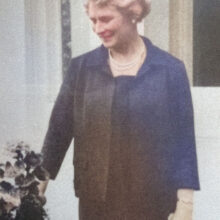
Dora 1986
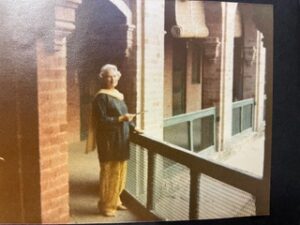
Karachi 1988
The mission hospital in the Transkii was however remote, and Dora rapidly saw the need for the local women to have some education for which at that time there was no provision at all, so she therefore began schooling them.
Once again her combination of charm, intellect and ability gave many of the local women an opportunity to learn to read and write as well as learn a trade, and the Weaving school she set up is still there and continues to flourish to this day.
In 1975 Bill and Dora returned to England and settled in Wimborne in Dorset. Dora retained her love of Pakistan however, and returned there on several occasions with Bill, and during one of these spent many months researching her father’s life and history, which culminated in her writing a biography of his life and the mission that he established in Sindh province.
By 1980 the school had increased to almost 200 pupils, and continued very successfully until 2016 when a combination of rising employment costs and an increasing number of other free schools in the area made it no longer viable.
Her legacy remains the love and spirit of independence and adventure that she stimulated in both her family and also the pupils who came into contact with her vivacious and capable personality, and founded on her Christian faith. She continued to strive for the equal rights of women and their independence throughout her life, and her guiding philosophy is succinctly summarised in the school motto she chose for Lavant House…’Tuum Est’, which means ‘It’s up to you’, or ‘It’s all yours’.

